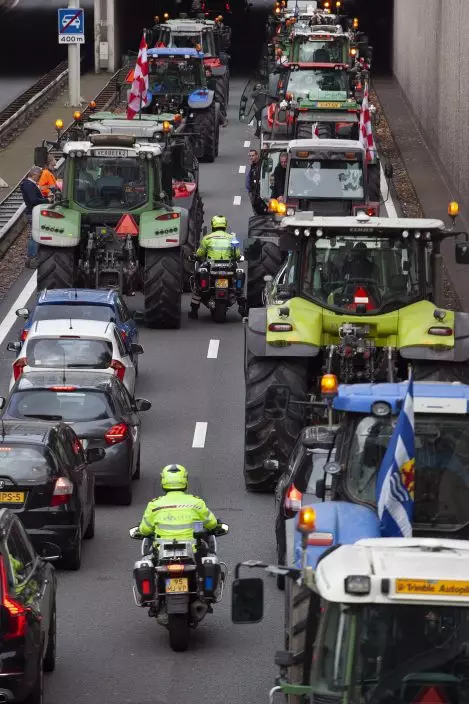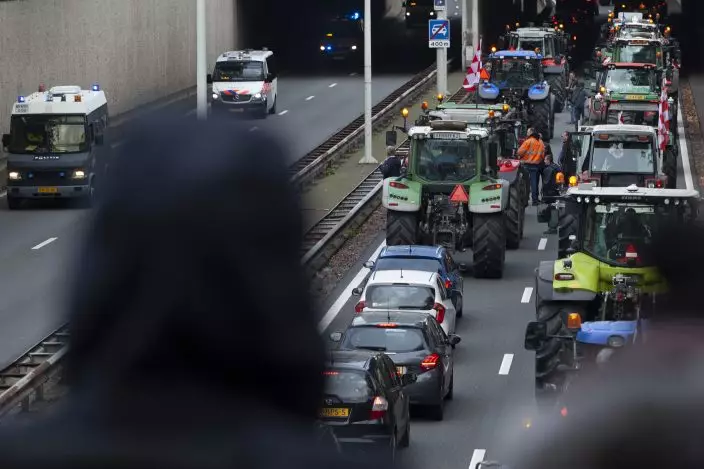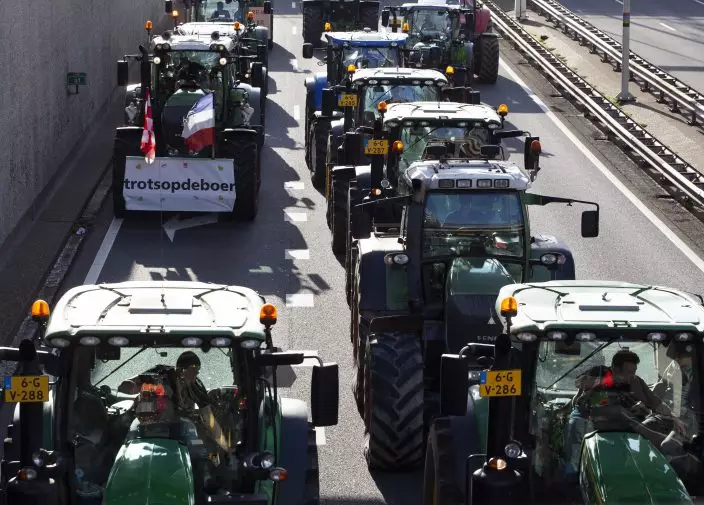Dutch farmers drove their tractors in slow-moving convoys across the country Wednesday to protest their treatment by the government as it seeks to rein in carbon and nitrogen emissions.
It is the second major protest this month by Dutch farmers who say the government is unfairly targeting them as it seeks to slash emissions.
"They blame agriculture for everything at the moment because of nitrogen emissions," said farmer Jans de Wilcher.

Protesting farmers block a main road leading to the center of The Hague, Netherlands, Wednesday, Oct. 16, 2019. Thousands of Dutch farmers protest over the Netherlands efforts to drastically reduce emissions of greenhouse gases. Among the farmers' demands are that the government does not further reduce the number of animals they can keep. (AP PhotoPeter Dejong)
He added that, "we as a sector store far more nitrogen than we produce. So we are actually helping the Dutch problem rather than making it worse - so why do we get the blame?"
Hundreds of drivers on tractors gathered in the central town of De Bilt to protest near the headquarters of the National Institute for Public Health and the Environment, which is responsible for measuring nitrogen emissions.
Farmers accuse the institute of inaccurately calculating nitrogen levels as the Dutch government struggles to meet European Union emissions targets in part by offering to buy up farms voluntarily.

Protesting farmers block a main road leading to the center of The Hague, Netherlands, Wednesday, Oct. 16, 2019. Thousands of Dutch farmers protest over the Netherlands efforts to drastically reduce emissions of greenhouse gases. Among the farmers' demands are that the government does not further reduce the number of animals they can keep. (AP PhotoPeter Dejong)
From De Bilt, the farmers were driving to The Hague, where the military parked heavy trucks at strategic junctions to help police block roads leading to the historic town center.
Farmers were driving their tractors onto a large grassy field just outside the center where their demonstration was scheduled to begin in the afternoon.
Some even drove along the North Sea beach, parking there and being driven into town on busses, police said.

Protesting farmers on tractors, one with a sign reading "Proud of the Farmer", block a main road leading to the center of The Hague, Netherlands, Wednesday, Oct. 16, 2019. Thousands of Dutch farmers protest over the Netherlands efforts to drastically reduce emissions of greenhouse gases. Among the farmers' demands are that the government does not further reduce the number of animals they can keep. (AP PhotoPeter Dejong)
Their lobby is powerful because of the economic significance of agriculture to the Dutch economy.
The Dutch farmers' organization, LTO, says exports from the country's nearly 54,000 farms and agriculture businesses were worth 90.3 billion euros ($98.3 billion) last year.
But it comes at an environmental cost, with farms emitting carbon and nitrogen.
Earlier this month, the government announced it is planning a raft of measures to rein in nitrogen emissions including a voluntary program to buy up old and inefficient farms and subsidies to help other farms modernize.
Other measures take aim at the construction and transport industries, which also are responsible for emissions.
One tractor in The Hague bore a sign saying simply: "No farmers. No food. No future."


